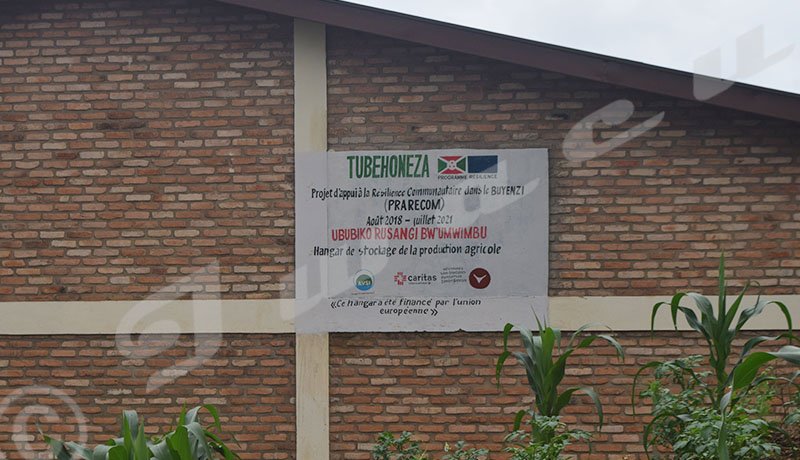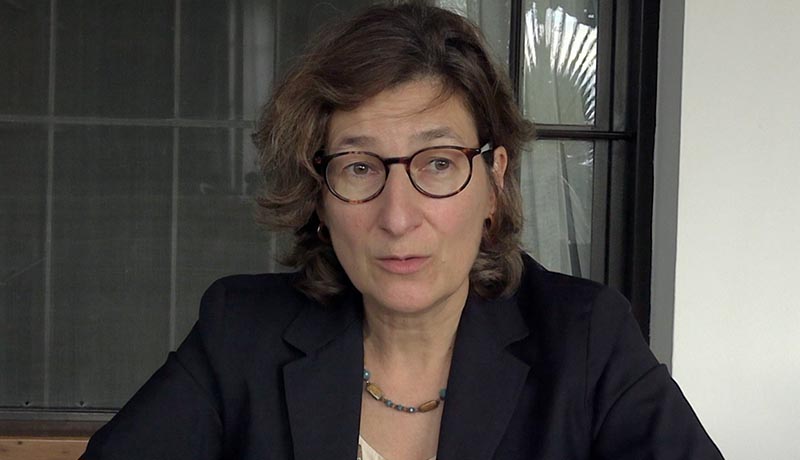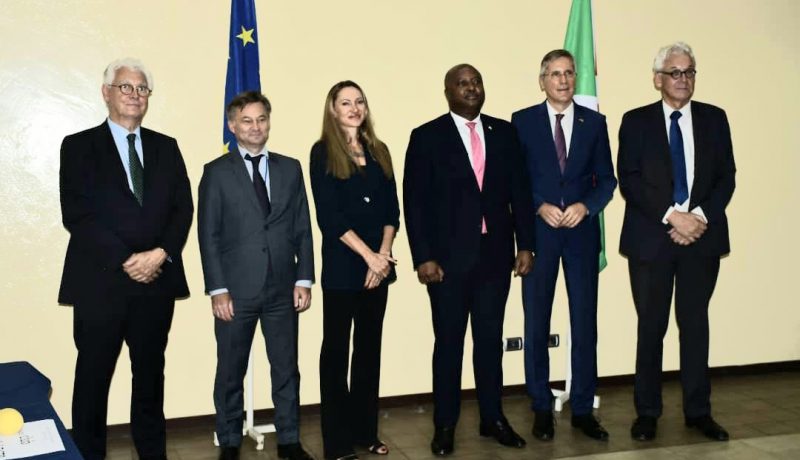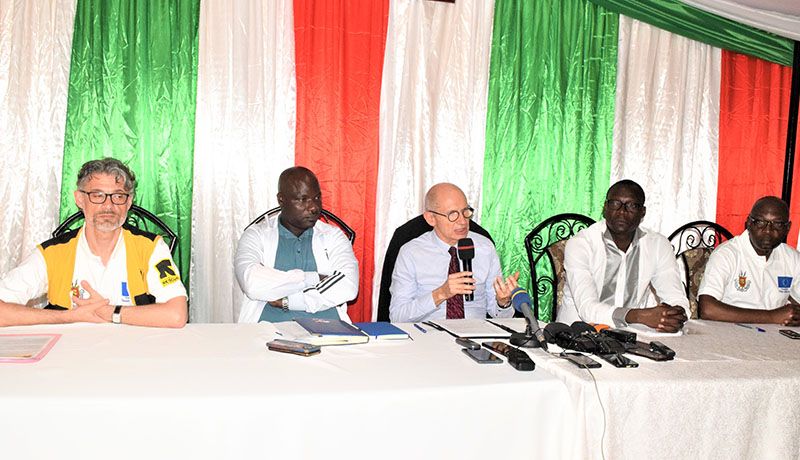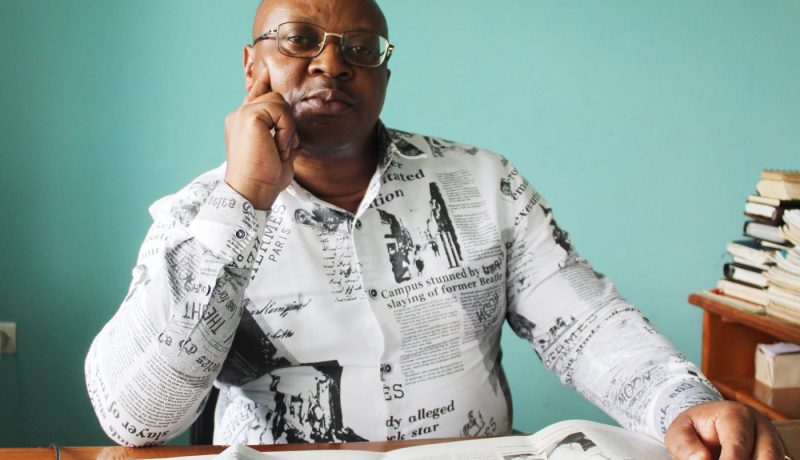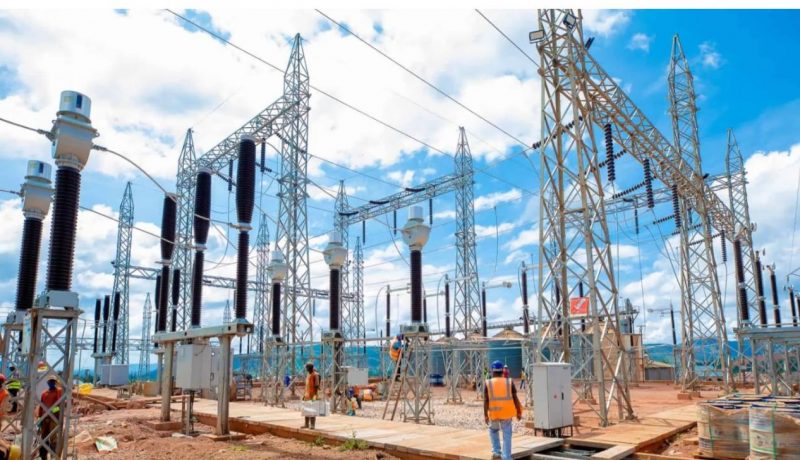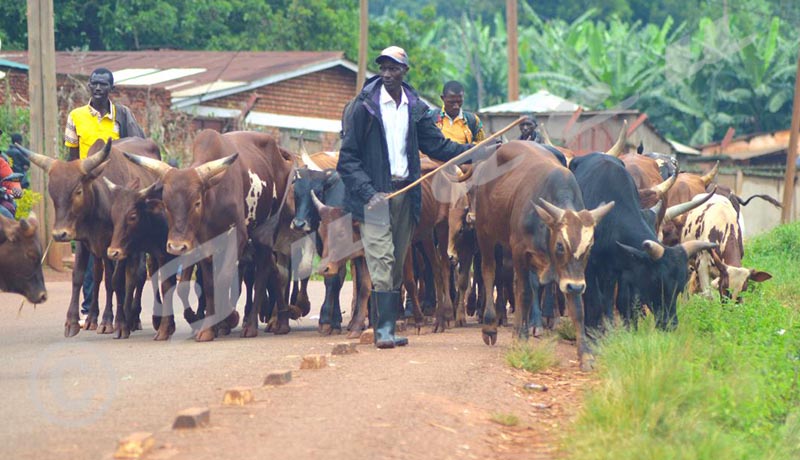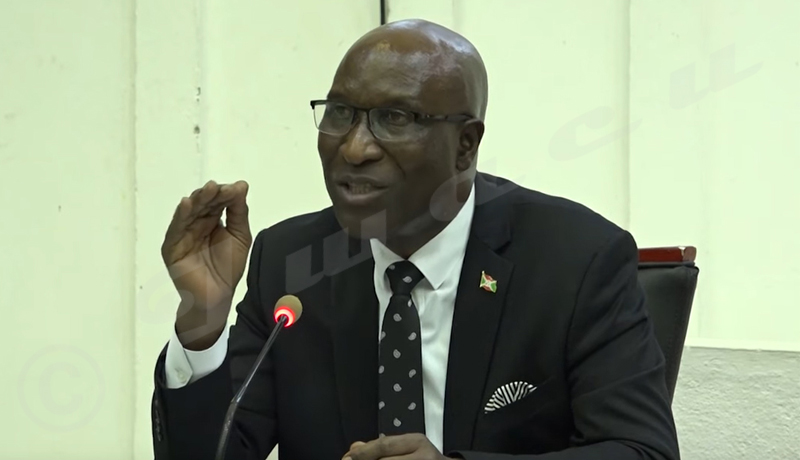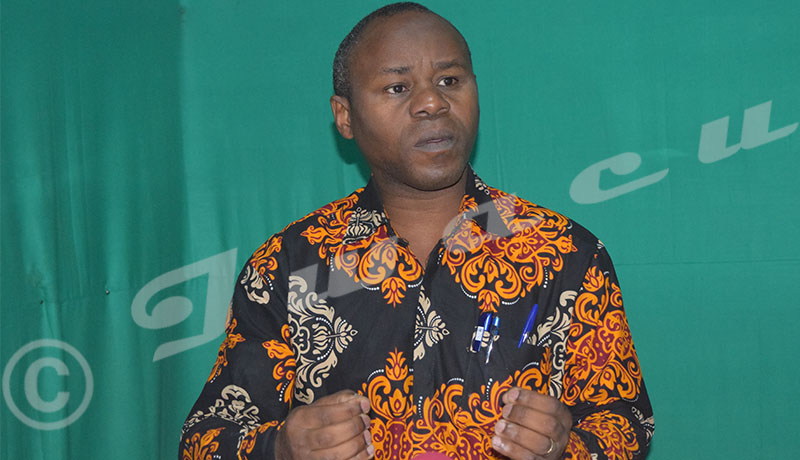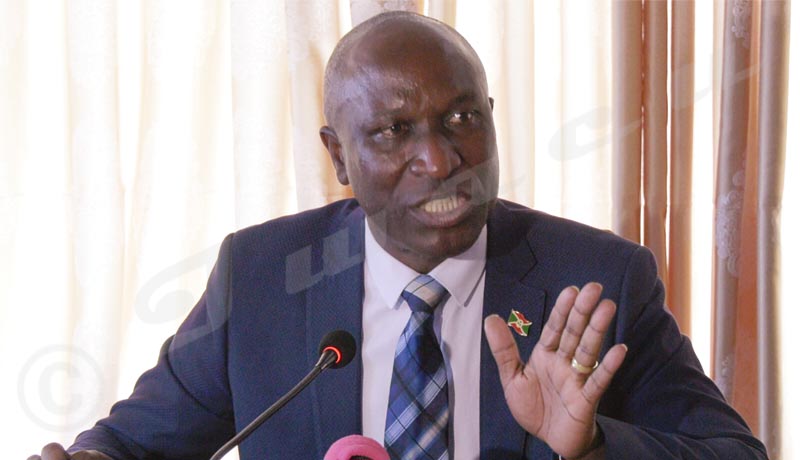During a joint visit to the Tubehoneza and Tubungabunge Isi Ndimwa projects, organized by the European Union delegation with the Ministry of Environment, Agriculture and Livestock this December 1st, beneficiaries expressed their satisfaction with achievements of these programs. They ask for more support to meet certain challenges.
Among activities carried out as part of the community resilience support project in Buyenzi (PRARECOM)-Tubehoneza, there is the construction of a storage shed and a chick production center in Muruta district in Kayanza province, north of Burundi.
Funded by the European Union for an amount of 4,877,358 euros, this project aims at contributing to sustainable alleviation of food insecurity and malnutrition by improving agricultural production and strengthening livelihoods of more than 2 million of people. It is implemented in Kayanza and Ngozi provinces. More than 200 thousand people have benefited from this project.
According to Déo Nduwayezu, head of the chick production center and beneficiary of the Tubehoneza program, the support of the European Union has considerably contributed to the development of poultry farming in Muruta district.
“The European Union helped us build this poultry center. They also trained us in poultry farming and trained poultry farmers who get their supplies here.”
According to him, this center has a capacity to incubate around 2,000 eggs: “At the moment, we have 500 chicks available which can be sold immediately. Customers come to order chicks every day.” He regrets that the center remains small to contain a large production of chicks.
For him, contracting loans from banks remains a major challenge: “We have ambitious plans to develop poultry farming, but we have nothing as a mortgage to apply for loans.”
For Lucien Sinzinkayo, poultry farmer, this chick production center came at the right time: “Before this center, I could not practice modern poultry farming. I bought 50 chicks there. At the moment, I can collect more than 30 eggs per day.”
He is delighted that food for chicks is also available in this center. He testifies having already bought 4 pigs with the money earned from the sale of eggs. In the future, Lucien Sinzinkayo plans to sell some pigs to buy a cow.
Life has significantly improved for his family: “I can easily get BIF 70,000 per week from the sale of eggs. Before, it was impossible to earn such a sum of money.” He thanks this center and the European Union’s support.
Harvest management and good nutrition reinforced
Apart from this chick production center, there is a storage shed built with the European Union’s funds. For Marie-Chantal Ntahomvukiye, a resident of Muruta district, this shed is a solution to the storage problems faced by the population of this area.
There were household conflicts following a poor management of the harvest, before the construction of this shed: “With this shed, the management of the harvest is good. It helped us protect the harvest and better preserve seeds.”
The manager of this shed deplores that it is not up to the size of the district’s needs. “We harvest a very large quantity of potatoes while this shed can only contain 50 tones. There is a need to expand it or build another one.”
In Ngozi district, Ngozi province, Girubuzima company manufacturing porridge flour makes a difference after being supported by the Tubehoneza program.
“I started by producing 40 kg of porridge flour. Thanks to the Tubehoneza project, the production has been multiplied by four,” says Goreth Sinankwa, founder and owner of this company.
She testifies to having received a lot of materials necessary for the preparation of porridge flour as well as training through the same program.
For Mrs. Sinankwa, her family life has positively changed following the support of Tubehoneza project: “Before, I asked everything from my husband. After the support of this project, the production increased. All of my children went to good schools. The proof is that the manager of my company is my eldest son.”
However, the lack of electricity remains a challenge for this porridge flour production factory. Goreth Sinankwa regrets that her factory has not yet met all the standards required by the Bureau of Standards and Quality Control (BBN). Hence, she requests the power supply to her factory.
The rural population mobilized for soil fertility
In addition to the Tubehoneza project, the European Union delegation and the Ministry of Agriculture and Livestock visited the implementation areas of the Tubungabunge Isi Ndimwa project that aims at improving soil fertility and profitability.
Funded at 8.05 million euros, this project covers 392 localities spread over 28 communes in five provinces (Karusi, Kayanza, Ngozi, Ruyigi and Cankuzo). Its beneficiaries are made up of 70,000 family farms (with particular attention to rural women and young people), 7,000 pilot farmers, staff from local organizations as well as agents from BPEAE (provincial office for the environment, agriculture and livestock).
For Térence Butoyi, farmer from Nyabizinu locality in Busiga district in Ngozi province, the support of the “Tubungabunge Isi Ndimwa” project has improved the living conditions of his family: “This project trained me to practice quality agriculture and preserve soil fertility. I was taught to draw contour lines to fight erosion.”
He explains that erosion had been destroying his fields before the intervention of this program: “With this project, I can contain all this water with contour lines and make good use of it.”
According to him, the harvest has enormously increased: “I have been a beneficiary of this project for two years. Before, I could harvest about 40 kg of beans. At the moment, I harvest between 400 and 500 kg of beans.”
Following this program’s support, he says that he has already bought a cow and 5 pigs, which help him support his family of 5 children.
Not far from Térence’s household, his neighbor makes organic manure from green material with the support of the “Tubungabunge Isi Ndimwa” program.
According to the agronomist Louis Hakizimana, the tools used in the manufacture of this manure were granted by Adisco NGO through the support of this program financed by European Union.
“This manure is very fertile. Crops fertilized with it give a favorable yield compared to others. It has nitrogen, which keeps the plants green until harvest,” he says.
He regrets that there is only one producer of organic manure on the whole area with more than 500 households, which means that not all households are supplied.
For him, this organic manure production initiative still faces the financial challenge: “We plan to expand to other areas, but our resources are limited. We work within projects that are coming to an end.”
“Food security needs of the rural population are enormous”
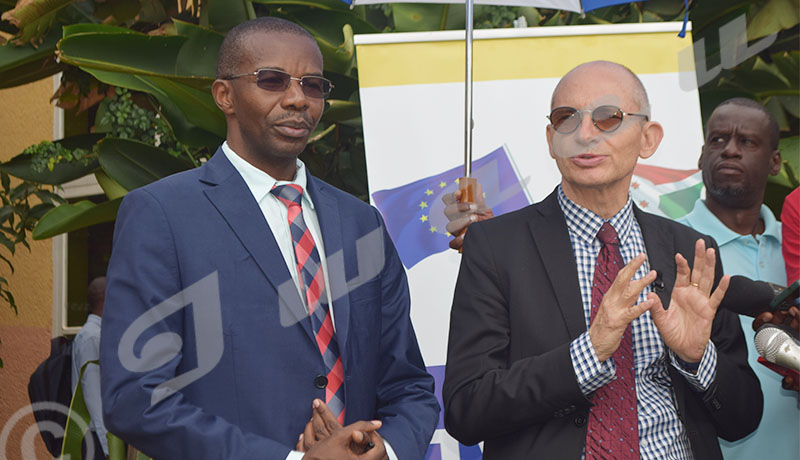
The Head of the European Union delegation in Burundi, Claude Bochu, says he is very satisfied with the achievements of the two visited projects. For him, the needs of the rural population in terms of food, nutritional security and growth prospects are enormous: “Natural resources on which they depend have already significantly deteriorated and are not infinite. The means made available by the various development partners are considerable, but undoubtedly insufficient to meet all these needs and challenges.”
To maximize the expected impacts at the level of the final beneficiaries, the Head of the European Union delegation in Burundi recommends, among other things, the coordination of all stakeholders in the rural development and environment sectors as well as the harmonization of development interventions approaches with the beneficiary population.
He recalls that the European Union and its member states present in Burundi have always given high priority to supporting the agriculture, livestock and environment sectors.
According to the Minister of Environment, Agriculture and Livestock, Sanctus Niragira, many achievements in the line of improving the population’s well-being are satisfactory.
For him, there are still practices to improve. Among the points to be improved, he highlights, in particular, the support of producers in increasing productivity in their fields, the increase in the size of sheds to serve the entire locality, the reduction in number of executing agencies to the same activity carried out in the same locality as well as the support for processing units in the certification of their products.
In addition, he criticizes the lack of correlation between achievements and the amounts allocated to these projects: “The sums invested in the environment, agriculture and livestock sector are colossal, but the development in this sector is not really substantial. This is a challenge to address.”
For more effective and efficient interventions, Sanctus Niragira recommends concerted action to reframe the orientation of all efforts: “There are multiple interventions that can be put together to produce a great thing that could have far-reaching effects.”
It should be noted that after the joint visit, on December 2nd, a sector orientation and planning workshop between Europe team and the ministry of the Environment, Agriculture and Livestock, was organized.
Over the past five years, the European Union has financed projects in the environment, rural development and nutrition sector for an amount of more than 75 million euros and more than 91 million euros in instruction phase.
